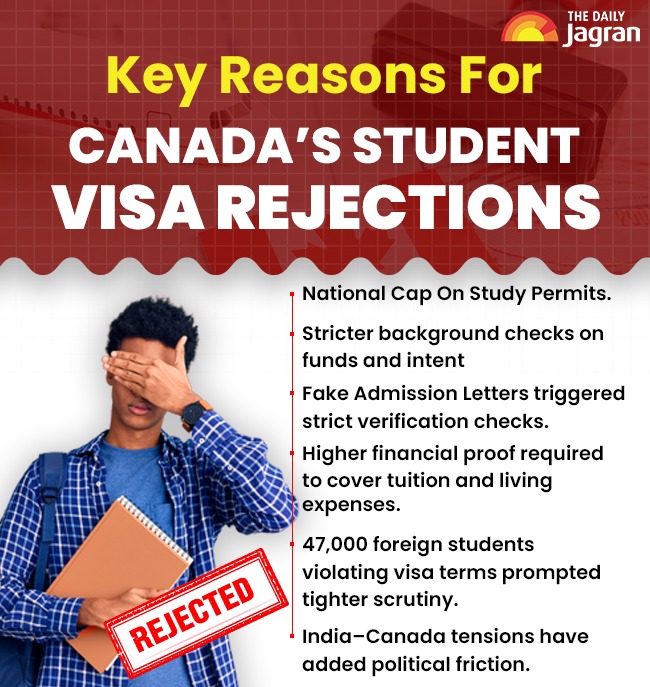- By Supratik Das
- Tue, 04 Nov 2025 12:32 PM (IST)
- Source:JND
The tougher immigration rules and fraud crackdowns in Canada have come as a blow to Indian students, once the largest group of foreign learners in the country. What was once a trusted route to global education has turned into a high-stakes gamble, with about three out of every four applications for study permits by Indian students getting rejected.
According to official data from Canada's immigration department, cited by Reuters, 74 percent of Indian applicants were refused study visas in August 2025, a sharp jump from just 32 percent during the same month two years earlier. The shift marks a stunning reversal for India, long the leading source of students for Canadian institutions.
Following are five major reasons for the increased rejections and sharp decline in the number of Indian student enrolments.
• National Cap on Study Permits
A decision by Ottawa to cap the total number of international study permits in 2024 has tightened further this year with an additional 10 percent reduction. Meant to control the flow of temporary migrants and help alleviate pressure on Canada's strained housing market, the move has drastically cut the available slots.
Immigration data shows steep falls in Indian applications: 20,900 in August 2023 down to 4,515 in August 2025, reflecting both stricter quotas and growing uncertainty among students.
• Crackdown on fake admission letters
A major trigger of the policy shift was a scandal over fake college admission letters in 2023. Authorities uncovered some 1,550 such letters, most of which related to applications from India. Tighter verification since then by immigration officials flagged more than 14,000 suspicious cases in the world last year alone. Real applicants today face more scrutiny, longer waits and even rejections for minor discrepancies.

• Higher financial proof requirements
From now on, students applying for a study visa will need to demonstrate significantly stronger financial backing than previously required. The new rules require higher proof of funds for tuition and living costs, a challenge that has left many prospective students struggling. According to officials, the change is aimed at ensuring students can take care of themselves; according to consultants, it has had the effect of pricing out many deserving candidates.
• India-Canada: A Diplomatic Strain
Relations between India and Canada have also been frosty. Ties between the two nations soured in 2023 after Canadian Prime Minister Justin Trudeau accused Indian agents of being involved in the killing of a Canadian citizen, an allegation India firmly denied.
While both nations have since taken steps to restore dialogue, the diplomatic chill continues to influence decision-making behind the scenes. During her visit to New Delhi, Canada’s Foreign Minister Anita Anand said Ottawa remains committed to welcoming Indian students but must “protect the integrity” of its immigration system.
• Visa Compliance and Stay Violations
Another reason for this clampdown is a growing number of visa overstays and rule violations. Canadian immigration authorities estimated that as many as 47,000 foreign students may currently be living in Canada without legal status. The revelation brought about a sweeping review of compliance systems-a closer eye on attendance records and study permit conditions.
As a result, immigration officers are being extra vigilant in approving applications that appear incomplete or that carry a high risk. Education consultants argue that the sudden surge in refusals is contributing to the diversion of Indian students to destinations like Australia, the UK, and Germany, where pathways to post-study employment are more consistent.
Canadian officials insist that the government's intent is not to shut the door on foreign talent, but to restore confidence in a system under strain. "Our goal is to preserve the integrity of the immigration system," an IRCC spokesperson said. Still, for thousands of Indian students who once saw Canada as a gateway to opportunity, that door now appears much harder to open.

